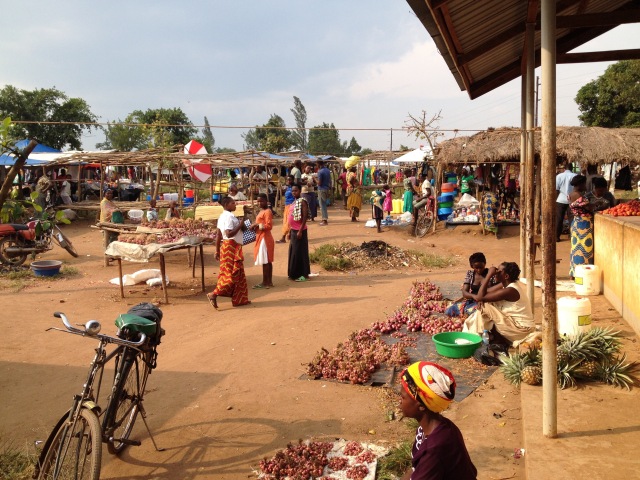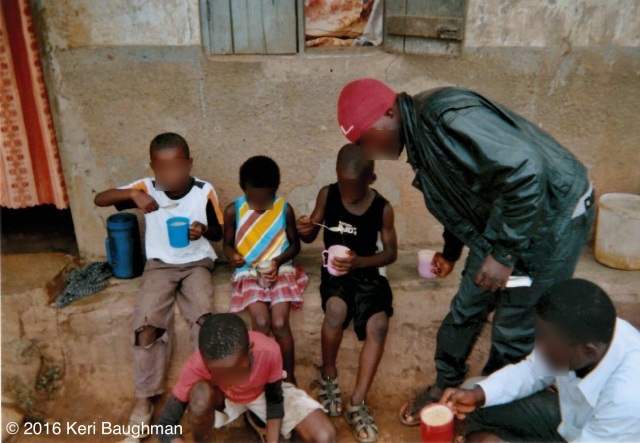AS you make your way along the bumpy dirt road into Kyaka II Refugee Settlement you will pass through Bukere zone, aka the “capital” of Kyaka. In Bukere you will find refugee-run bars, restaurants, and small shops selling everything from homemade alcohol to kids toys. When the electricity is working, a festive atmosphere is present during the evenings with loud music and large crowds. Along the main road are a few shabby wooden shelves holding jerry cans of gasoline. One of the men waiting for customers, almost always wearing his kofia (hat worn by men, particularly Muslims), is Ibrahim (not his real name).
Ibrahim was born and raised in the Democratic Republic of Congo (DRC). Him, his wife, and their 2 children fled in the late 1990s during a particularly unstable period after Ibrahim was attacked and tortured by rebels who were infiltrating the area. [For a very brief overview of the conflicts in Eastern DRC click here]. In one incident, Ibrahim was smashed in his eyes with the butt of a gun. In another he was beaten until his back became so sore that he could no longer walk. When he was recounting these memories to me during our interview I could sense his pain, still present even years later.
After a long time spent seeking safety, his family found themselves in Kampala, Uganda and for 6 years they tried to make a life there. But living as an urban refugee proved harder than they imagined; life in Kampala is extremely expensive compared to more rural parts of the country. So, in 2005 they were happy to be given a plot of land in Kyaka II. By that time they had 4 children and over the next few years they would have 3 more making them a large family of 9. The living conditions in Kyaka were minimal, but at least they had a home to sleep in, space to farm, and they were safe.
Since the tortuous incidents in DRC, however, Ibrahim had been suffering from eye and back problems. A humanitarian organization working in Kyaka II gave him a back brace, but his eyes required surgery. After a long wait, the surgery was scheduled and Ibrahim traveled to Kampala with high hopes. The surgery went well, but when he returned home to Kyaka he found that his wife, the mother of his 7 children, had abandoned them. She had simply picked up her things and left, never to return. “Life was too difficult for her here” Ibrahim said, “so she went to live with another man.” Ibrahim was crushed because he loved his wife, but also because he had no idea how he would be able to raise their 7 children all alone.

WHEN I met Ibrahim the first time he immediately invited me inside his home – Congolese hospitality is wonderful. Like Marcus, Ibrahim has a small rectangular home built out of mud and sticks. Although Ibrahim feels lucky because he has a roof made out of iron sheets giving him and his children an added level of protection against the rain, wind, and insects. After we sat down in his small room on handmade wooden chairs, I explained to him the nature of my research and he smiled genuinely and said “Today you have remembered us single fathers! Researchers are usually only interested in women and single mothers.”
At this moment I realized to what extent Ibrahim, and surely the other single fathers as well, felt overlooked by researchers and the humanitarian system as a whole. However, I was perfectly aware of the limits of my research – a thesis, potentially a publication, and a few “congratulations” from peers and professors in Geneva – but absolutely nothing I planned to do would substantially change the unfortunate situation that many of these men find themselves in. I asked Ibrahim and the other single fathers with whom I spoke what would make their lives easier and they each said they needed (obviously) more money to pay school fees and buy clothes, food, and medicine. And it’s for that reason that I started this blog and fundraising campaign because a few dollars will make a difference for them.
AS we sat chatting inside his home, interrupted every few minutes by one of his children who would pop their head inside and ask him a question, Ibrahim told me some details about his life in DRC before he came to Uganda. He described his spacious brick house – it was evident that he was proud of it. He also spoke lovingly about his mother. He explained how she was a successful businesswoman and had taught him all she knew: Ibrahim ran two small businesses in DRC thanks to her guidance. He was good at catering to his clients. So when he arrived in Kyaka II he tried to launch a small business selling secondhand phones from Kampala, but he said “technology is progressing so fast and everyone here wants touch phones now which are a lot harder for me to find”. He changed his approach and started selling gasoline because it required very little start up cash. He said this type of work is not very lucrative because there are not a lot of customers in Kyaka II – vehicles are a luxury that are completely out of reach for the vast majority. If people in the settlement need to go somewhere they walk, often several miles, and for those who can afford the small fee, small motorcycles and dirt bikes that function like taxis are available. His main clients are therefore the boda-boda drivers (motorbike taxi drivers) who want to buy their gas on credit and sometimes delay paying him.
Ibrahim said “I don’t make much money, but I don’t know what else to do. It is better than sleeping or being idle.” On a good day he can sell one full jerry can and make around 5,000 UGX (approximately $1.45). Other days he only sells half the jerry can. “I make enough for us to barely survive” he said.

FOR Ibrahim, being a single father is challenging. He is double burdened with housework and his job. When his wife was with him she took care of the children and their home leaving him plenty of time to organize his businesses. Now, he cannot always afford food for his family; his children often have to do without breakfast even though they are hungry. Although he knows how to brighten their day: “When I bring home sugar for them to put on their porridge they are happy”. But he does not always have the money, and he currently owes 19,000 UGX (approximately $5.51) to a local shop where he bought rice and sugar on credit.
He also cannot afford school fees for all of his children. His two oldest dropped out of school and are working in Kampala, but the other 5 still live with him in Kyaka. The oldest, a 16-year-old boy, had to drop out of school last year because the fees became too expensive when he entered high school (high school fees are higher than middle and elementary school fees). The boy now stays at home and helps Ibrahim take care of the house and look after the younger children, his own childhood cut short. When I asked Ibrahim how he manages to deal with all these challenges, he told me that he enjoys going into town sometimes and watching soccer with his friends after his children are sleeping. It’s a time when he can relax, unwind, and forget, however briefly, his worries about the future.
I sat and talked to Ibrahim for a few hours as people rushed about outside, visiting shops, talking, and carrying on with their day. When the time came for me to say goodbye to Ibrahim, I got up to leave and he stopped me and asked “How can my children have a future like yours? I want them to be educated and do their own research.” He continued, “I am very proud of my children and I want them to have a future. I must give them a future.”
If you would like to donate to Ibrahim please click here.
